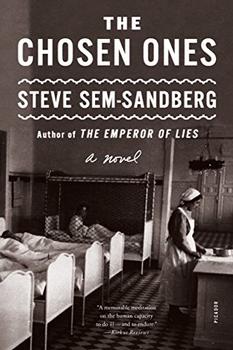Summary | Excerpt | Reviews | Readalikes | Genres & Themes | Author Bio

A Novel
by Steve Sem-Sandberg
A Christmas Celebration (and its consequences) In December 1940, the Ziegler family celebrated their first Christmas together. Helmut joined them once the reluctant Haidingers had been persuaded to 'hand him back for the duration'. They'd had family Christmases before in the Simmeringer flat, with a tree and all the trimmings, but it always ended with everyone, uncles and aunties included, waiting around at the table where the place laid for the head of the household stood empty. With any luck, he would turn up near midnight, drunk, alone, or with mates he had fancied bringing along. If he was on his own, he'd be furious because there was nothing but sweet rubbish on the table and would take it out on Leonie, hit and kick her, shouting that she was a useless slut not worth wiping the floor with. This time, though, they would have a proper Christmas. With one week to go until Christmas Eve, Adrian and his father walked to Rochusmarkt and picked a real fir tree to take home. At school, one of the teachers, who clearly wasn't a totally convinced Nazi, allowed them to write essays on the theme My Best Christmas and even let them build their own nativity cribs. Adrian's sister Laura became so excited at the thought of all the fun they'd have over the festive days that she spent an entire afternoon dashing in and out of the shops on Mariahilfer Strasse. She made one of her friends from school distract the shop assistants while she picked all the lovely, shiny things she could find room for under her sweater, like many-coloured glass balls and glittering strands of tinsel. They were sitting on the steps leading up to the Westbahnhof platforms, tarted up like little princesses with tinsel threaded through their hair, when the police caught up with them. It wasn't the first time that Laura had been caught shoplifting. Most of it was small-scale, like pencils and erasers and other things she needed for school, or chocolate and fruit from the stalls in the market. But times had changed. Before, staff from the departments of social services and health had at least tried to be sympathetic and helpful, but now everyone was relentlessly strict. Vagrancy and larceny were crimes, and correct punishments had to be meted out. Laura's behaviour was especially vexing, as she obviously 'tempted others to follow her'. When the social workers came for a home visit two days into the new year, they took note of the fact that Adrian, Helmut and Laura not only shared the same bed but also played 'Mummy-Daddy-Children' underneath a rigged-up tablecloth and, furthermore, that Adrian and Helmut were both naked, all of which was interpreted as an indication of incestuous relationships in the family. The children are dirty and malnourished, and their manners have been allowed to degenerate. They are rebellious and foul-mouthed. The report included a long passage about Adrian Ziegler, who is described as an insolent and degenerate boy who, when adults are talking, incessantly interrupts with obscene expressions and invectives. I can't remember any of us being insolent, Adrian commented when he saw the report much later. On the other hand, I do remember how they interrogated us one at a time, he said, and tried to make us say things about our parents that were not true. For instance, they wanted me to tell them about my mother, how she was slovenly and had failed to look after the family, and then I burst into tears. I knew that my mother had worked, unselfishly and unaided, for more than twelve years, doing her best to keep her children clean and in decent clothes, seven of us in the end, and have food put in front of us every day. They could never make me say that she had failed to look after us. The family was split up again. They decided that Mrs Leonie Ziegler (née Dobrosch) had enough on her hands with her two youngest. The authorities looked for a new foster family for the eldest, Laura, who was almost fifteen and needed to prepare for her Pflichtjahr, when she had to go away and learn how to do practical tasks in the house and on the land. A place in a children's home on Bastiengasse in Währing was found for Helmut. Adrian was sent to Spiegelgrund, which had just been designated a specialist clinic for children with severe psychiatric or neurological conditions, but which also served as a re
Excerpted from The Chosen Ones by Steve Sem-Sandberg. Copyright © 2016 by Steve Sem-Sandberg. Excerpted by permission of Farrar, Straus & Giroux. All rights reserved. No part of this excerpt may be reproduced or reprinted without permission in writing from the publisher.
Your guide toexceptional books
BookBrowse seeks out and recommends the best in contemporary fiction and nonfiction—books that not only engage and entertain but also deepen our understanding of ourselves and the world around us.